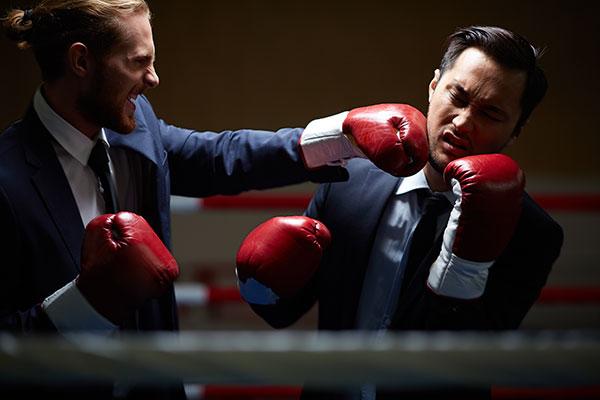When civility in family law court breaks down, the proceedings need a hard stop. Judges often try to curb bad behavior with polite remonstrances; unfortunately, these palliatives work infrequently at best.
By Mark Ashton, Family Lawyer

Earlier this month I attended a program on civility in family law. Because I have been doing this so long, I knew the presenters. Civility programs tend to boil down to:
1. Judges respect civil lawyers and that is an advantage to the lawyer in a case.
2. Judges know who the bad guys are and tend to “act accordingly.”
3. Civility allows for better-considered rulings and enhances the judicial process.
Where are all the bad uncivil lawyers when the good lawyers get together to attend a course on civility? Are they gathered under a bridge somewhere plotting the demise of the civil lawyers – practicing their interruptions and personal attacks? I worry about such things.
The one line that always bothers me is: “Because you are attending a program where the topic is civility, we know you attendees are not part of the problem but rather the solution.” When I hear this, I look around the room and I inevitably spy colleagues whom I know to be part of the problem and not the solution. Second, my paranoia makes me wonder, “Where are all the bad uncivil lawyers when the good lawyers get together to attend a course on civility? Are they gathered under a bridge somewhere plotting the demise of the civil lawyers – practicing their interruptions and personal attacks?” I worry about such things.
So, while attending these programs my mind tends to wander. How do we become more civil at a time when our political discourse is so antagonistic? Frankly, in the past few years, the courts seem to be a refuge of civil behavior in contrast to what the other branches of government endure. Contrast the Black Lives Matter protests and the recent marches in Charlottesville and the US Capitol with the verdicts as they were read in the criminal trials involving the deaths of Ahmaud Arbery and George Floyd.
Civility in Family Law: Judicial Control of the Room
The Courts are working. The results are not always to our satisfaction, but they are working. A big part of this is judicial control of the room. The courtroom is a theater of sorts. Tall ceilings, large windows, an elevated bench and witness box. One of the problems with remote court appearances using electronic media is that everyone is the same size. Like Hollywood Squares, the judge is in one box and the lawyers and litigants in others. The idea of courtroom design is to signal that this is not an ordinary place. The administration of justice has a higher purpose. Many clients have told me after testifying that when they climbed into the witness box, they saw the world a little differently than they did on the street or even sitting next to counsel. That is worth remembering when courts decide where a proceeding takes place.
A Zoom call where your witness is sitting in his family room with a hot coffee and danish – perhaps in sweats or even pajamas – while offering the “whole truth” is not going to yield the same result as one in the typical courtroom. Judges and attorneys need to balance convenience against formality when deciding the venue for a proceeding.
Why Does Civility Break Down in Family Court?
When I consider what causes civility to break down in the courtroom I keep circling back to the issue of control. Judges who lecture on civility tend to focus on controlling the presentations as they receive them. In so doing they tend to forget the “elephants in the room”: i.e., the clients. They are undisciplined animals in an unfamiliar place. They hired their lawyer not in pursuit of fairness but in a desire to win while the other side loses everything. And in their narrow view, when the opposing lawyer is talking, they are (a) not getting their money’s worth, and (b) losing. Judges sometimes notice this when they remark that a client needs to stop interrupting or rolling their eyes. Most clients don’t have a clear understanding that each side gets to present and rebut. Experienced clients understand that but don’t really care. They think it’s part of my job to shut the other lawyer up at all costs. After all, that lawyer is not telling the truth anyway, right?
Appellate work is far cleaner. In Pennsylvania, each side gets 30 minutes of uninterrupted argument and the appellant can take off a slice for rebuttal. I can tell my client that the other side’s time allotment can be excruciating but it is limited, and we get the same amount of time. In trial court work, most proceedings are far less structured, which is where the problems emerge. Let’s assume my unworthy opponent is asked to make an opening statement. When there is no time limit to that statement and no restriction on its breadth, both the client and I begin to stress: the client stresses because he/she thinks we are on a downward spiral from the moment my opponent starts talking; I am stressing because I don’t know when I will be able to rebut these statements, and we have all seen opponents drone on and on, introduce facts for which there will be little or no evidence, or engage in other conduct intended to improperly color the case.
How do we Reclaim Civility in Family Law?
Judges often think they are being kind by allowing lengthy speeches. They are not. In fact, my client will think me a failure if my opponent speaks for eight minutes and I speak for five. And if I do not rebut every single assertion by my opponent, again, my client is thinking his expensive mouthpiece has been disabled. Judges will tell me, “You know that didn’t matter.” To which I say, “Not to you and not to me – but my client thought you were hanging on every word opposing counsel uttered.”
Clients have changed. When I started practicing in 1982 after a clerkship, there were lawyers in Philadelphia about whom you would hear clients say they wouldn’t think of making a move without the blessing of that lawyer. Today, law is a commodity – and if you doubt it, realize that LegalZoom does $200 million in revenue.
How do we get “civil” back? From the bench. A judge who has read the “papers” before the argument or hearing can step on the bench and define the issue(s). That signals to all parties and counsel the judge is in charge. Then the judge can indicate how much time they want to hear from each side on that issue. No rodomontades tolerated. They can insist that any argument or objection be short and to the point, then move on and demand that the lawyers do the same. When counsel starts to become informal or drift off point, the judge needs to rein that in. Bad conduct begets bad conduct and clouds the judicial process. Yes, there are times when arguments will drift – but they should drift at the sufferance of the judge, not the indulgence of the lawyer.
Once the incivility cat escapes the bag, attorneys tend to divert energy from educating the court and double down on amusing the paying client.
When incivility breaks out, the proceedings need a cold stop. Judges commonly try to merely curb bad behavior, hoping that their polite remonstrances will correct the situation. Truth is that these palliatives work infrequently at best. Once the incivility cat escapes the bag, attorneys tend to divert energy from educating the court and double down on amusing the paying client. How does a judge stop this? First, halt the proceedings for either a sidebar or chambers conference. Then instruct counsel what is going on: specifically, that the court is losing the attention of the lawyers in favor of entertaining the clients. If it persists, the court should not hesitate to begin turning attention to sanctions against one or both lawyers. Nothing focuses the eye of uncivil counsel better than having the threat of money extracted from their pockets.
There are two reasons. First, rare is the client who will reimburse a mouthy lawyer for a sanction imposed by the court. The second, more important reason is the effect of an attorney sanction on the attorney-client relationship. Clients want zealous advocacy and have little appreciation for when it crosses the line of civility. But when their mouthpiece incurs a fine for that kind of indulgence, clients quickly lose faith in their lawyer’s skill. In the end, they employ attorneys to win the court over to their side. Even a modest sanction from the bench signals that their zealous counsel may be losing the war.
Judicial Sanctions are Relatively Rare

Perhaps it was my inexperience, but early in my career, I found that judges had little interest in what litigants and counsel thought of them. Many jurists were outright surly and would not hesitate to use their powers to push their views rather than allow the advocacy to play out. Those days have yielded to a zeitgeist in which judges are friendly. There is nothing wrong with “friendly,” and I have observed judges use their wit and humor to defuse uncivil behavior. That’s a rare quality, and in an age when we are surrounded by uncivil behavior in our streets and even our halls of government, the bench and the bar need to unite to insist that the courtroom is a sanctuary of quiet reason, not naked aggression.
Our clients want their counsel to win, and many clients conflate aggression with legal skill. The judiciary needs to understand that civility begins to erode the second that uncivil behavior is tolerated – and that once the uncivil bull escapes its pen, it is not easily recaptured.
Mark Ashton is a Partner at Fox Rothschild, LLP. A longtime officer in the Pennsylvania Bar Association, Mark served as the 2016 Family Law Section chair. He is the former president of the Doris J. Freed American Inn of Court, a group of 60 attorneys in the Philadelphia area concentrating in family law. Additionally, he served as a board member of the Montgomery Bar Association and Historic Yellow Springs, Inc. where he also was President from 2009-2012. www.foxrothschild.com
Related Content
Civility and Family Law – Not an Oxymoron
Ten ways attorneys can help their clients solve their family law issues without high-conflict maneuvers, the necessity for emergency hearings, incessant motions, and months of depositions.
Wise Words from Three Judges
Three experienced judges offer advice on how family lawyers can improve their chances of winning cases.
Podcast: Judge Lowrance on the Tools and Skills a Family Lawyer Needs
Besides the tools and skills a family lawyer needs, an understanding of the emotional trauma a client suffers because of the divorce is a must.
At Trial, Word Selection Matters: the Right Words Create the Perfect Narrative
How do you simplify your case’s story into a unified theme for trial, setting it apart from all the other cases on the judge’s docket? The key is word selection!






